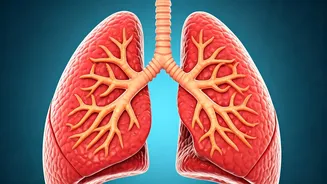Processed Meats Beware
Processed meats, often found in sandwiches and quick meals, pose a threat to lung health. These meats contain high levels of nitrates, which are used as
preservatives. When ingested, these nitrates can trigger inflammation in the respiratory system. This inflammation contributes to the narrowing of airways and heightened sensitivity, potentially worsening conditions like asthma or chronic obstructive pulmonary disease (COPD). The consumption of processed meats has been associated with increased risk of respiratory ailments, making it vital to moderate intake.
Sugary Drinks' Impact
Sugary drinks are linked with several adverse health effects, including a negative impact on lung function. The high sugar content in these beverages contributes to inflammation throughout the body, including in the lungs. This inflammation can cause airway constriction, making breathing more difficult. Furthermore, frequent consumption of sugary drinks can increase the likelihood of weight gain, which places extra pressure on the respiratory system. Choosing water, herbal teas, or naturally flavored drinks can help maintain lung health.
Salty Foods' Role
Excessive salt intake can lead to fluid retention, causing swelling and bloating, which can indirectly affect lung function. When the body retains fluids, it puts additional pressure on the respiratory system, making breathing harder. High salt consumption is associated with increased risk of conditions like hypertension, which can further impact lung health. Avoiding over-salted foods, such as packaged snacks and fast food, and opting for fresh, unprocessed ingredients, can help reduce sodium intake and improve overall respiratory well-being.
Refined Carbs' Effects
Refined carbohydrates, like white bread and pastries, can contribute to chronic inflammation, which has detrimental effects on lung health. These foods tend to spike blood sugar levels rapidly, leading to inflammatory responses in the body. Chronic inflammation in the lungs can exacerbate existing respiratory problems and elevate the risk of developing new ones. Replacing refined carbs with whole grains can help mitigate inflammation and support better lung function. Prioritize foods like whole-wheat bread, brown rice, and oats.
Dairy's Potential Issues
For some individuals, dairy products can trigger increased mucus production in the respiratory system. This excess mucus can lead to congestion, making it harder to breathe freely. Although not everyone experiences this effect, individuals with asthma, allergies, or other respiratory sensitivities may find their symptoms worsen after consuming dairy. If you suspect dairy is affecting your lungs, consider alternatives like almond milk or soy milk to observe if your breathing improves.
Fried Foods' Impact
Fried foods are often high in unhealthy fats that contribute to overall inflammation. When the body is in a state of inflammation, the lungs become more susceptible to irritation and potential damage. The oils used in frying can also release harmful compounds when heated, adding to the respiratory burden. Reducing your intake of fried foods and choosing healthier cooking methods, such as baking, grilling, or steaming, can significantly benefit your lung health and reduce exposure to harmful substances.
Alcohol's Respiratory Effects
Excessive alcohol consumption can negatively affect lung function. Alcohol can impair the body's natural defenses against infection, making the lungs more vulnerable to inflammation and illness. It can also suppress the cough reflex, making it harder to clear airways of irritants and mucus. Regular heavy drinking is linked with a higher risk of respiratory diseases. Moderation is key. Sticking to recommended limits and avoiding excessive alcohol consumption can safeguard your lungs and ensure healthier breathing.













